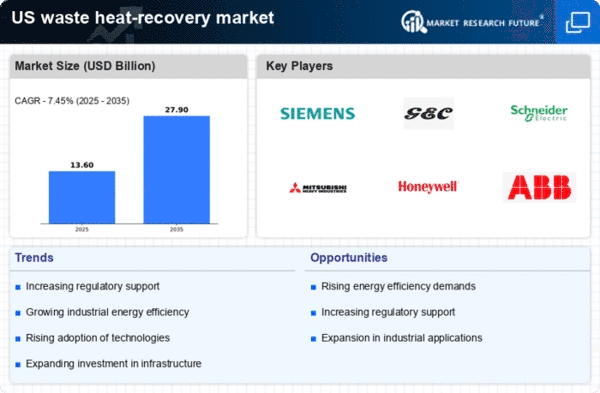Rising Environmental Regulations
The implementation of stringent environmental regulations in the U.S. is driving the growth of the waste heat-recovery market. Regulatory bodies are increasingly mandating reductions in greenhouse gas emissions and promoting sustainable practices. For instance, the Environmental Protection Agency (EPA) has introduced various initiatives aimed at reducing industrial emissions, which may encourage the adoption of waste heat-recovery technologies. In 2025, it is estimated that compliance with these regulations could lead to a market expansion of around 15% for waste heat-recovery systems. This regulatory landscape compels industries to invest in technologies that not only comply with legal requirements but also enhance their sustainability profiles. Consequently, the waste heat-recovery market is positioned to thrive as companies seek to align with these evolving environmental standards.
Increasing Energy Efficiency Demands
The growing emphasis on energy efficiency within various industries is a primary driver for the waste heat-recovery market. Companies are increasingly seeking methods to optimize energy use and reduce operational costs. The U.S. government has set ambitious energy efficiency targets, which may lead to a projected increase in the adoption of waste heat-recovery systems. In 2025, the energy efficiency market is expected to reach approximately $100 billion, with a significant portion attributed to waste heat-recovery technologies. This trend indicates a shift towards sustainable practices, as industries aim to minimize waste and enhance productivity. The waste heat-recovery market is likely to benefit from this heightened focus on energy efficiency, as businesses recognize the potential for substantial cost savings and improved environmental performance.
Economic Incentives for Energy Recovery
Economic incentives provided by federal and state governments are fostering growth in the waste heat-recovery market. Programs that offer tax credits, grants, and rebates for energy-efficient technologies encourage businesses to invest in waste heat-recovery systems. In 2025, it is anticipated that these incentives could lead to a market increase of approximately 10%, as companies seek to capitalize on financial benefits while enhancing their sustainability efforts. The availability of funding and support mechanisms may lower the initial investment barrier, making it more feasible for industries to adopt waste heat-recovery solutions. Thus, the waste heat-recovery market stands to gain from these economic incentives, which align financial interests with environmental goals.
Growing Industrialization and Urbanization
The rapid pace of industrialization and urbanization in the U.S. is a crucial driver for the waste heat-recovery market. As industries expand and urban areas develop, the demand for energy-efficient solutions becomes more pronounced. The industrial sector, which accounts for a significant portion of energy consumption, is increasingly adopting waste heat-recovery systems to mitigate energy costs and environmental impact. In 2025, the industrial sector is expected to contribute to a market growth rate of around 12% for waste heat-recovery technologies. This trend suggests that as urban centers grow and industries evolve, the waste heat-recovery market will play a vital role in addressing energy challenges and promoting sustainable development.
Technological Innovations in Heat Recovery
Technological advancements in heat recovery systems are significantly influencing the waste heat-recovery market. Innovations such as advanced heat exchangers, organic Rankine cycle systems, and thermoelectric generators are enhancing the efficiency and effectiveness of waste heat recovery. These technologies are becoming more accessible and cost-effective, which may lead to increased adoption across various sectors. In 2025, the market for advanced heat recovery technologies is projected to grow by approximately 20%, reflecting the industry's response to the demand for improved energy solutions. As industries recognize the potential for enhanced performance and reduced energy costs, the waste heat-recovery market is likely to see a surge in investment and implementation of these innovative technologies.
















